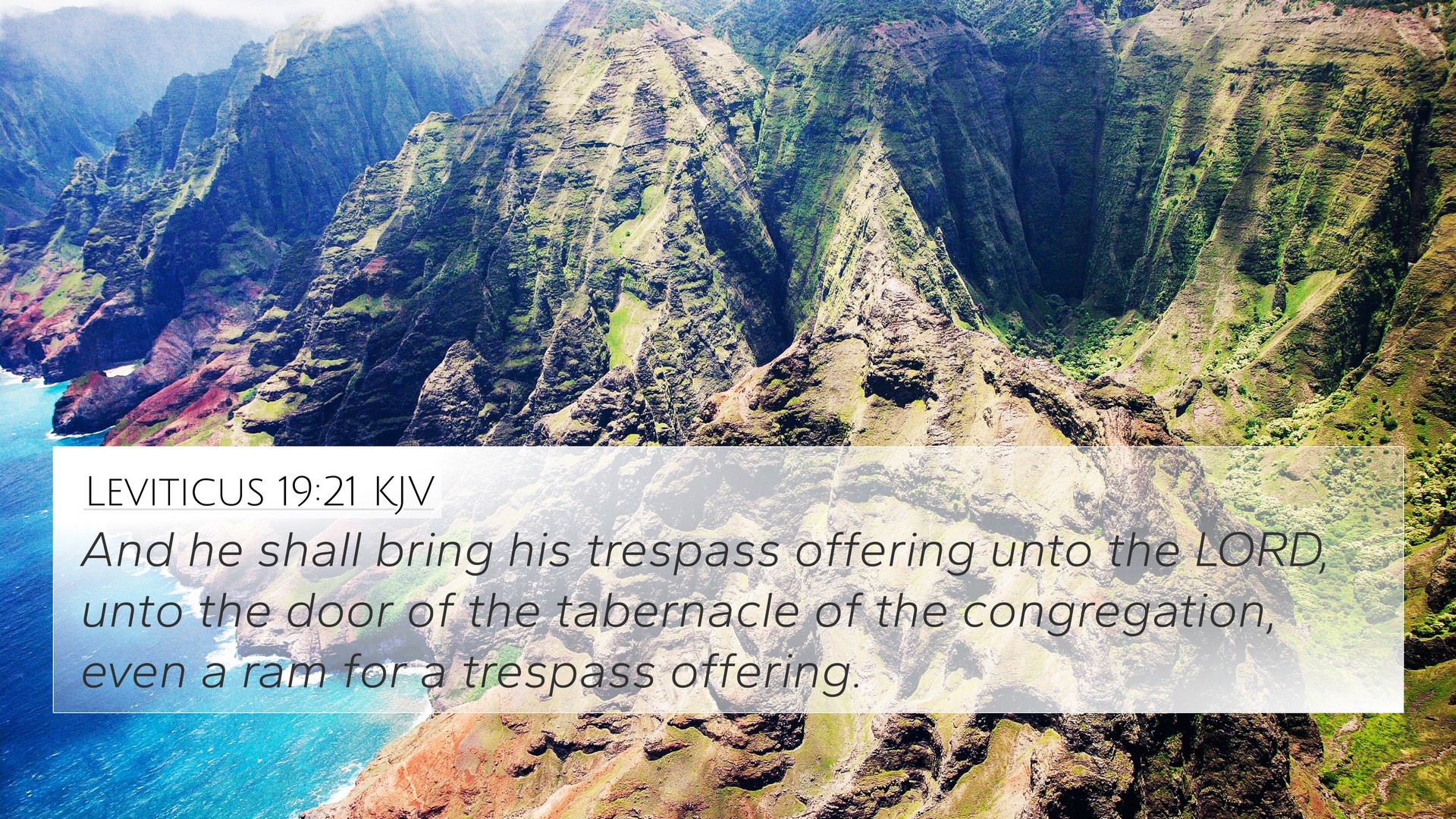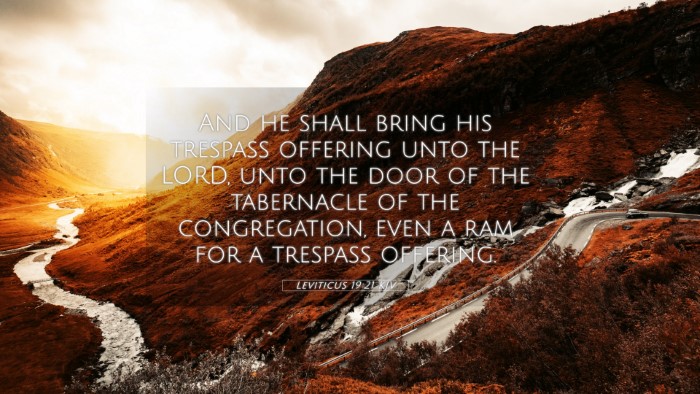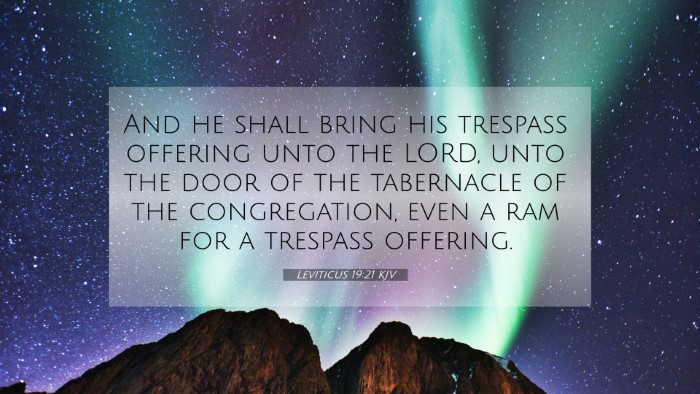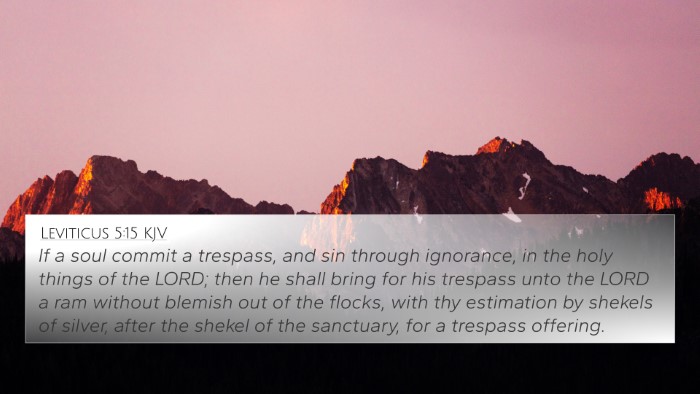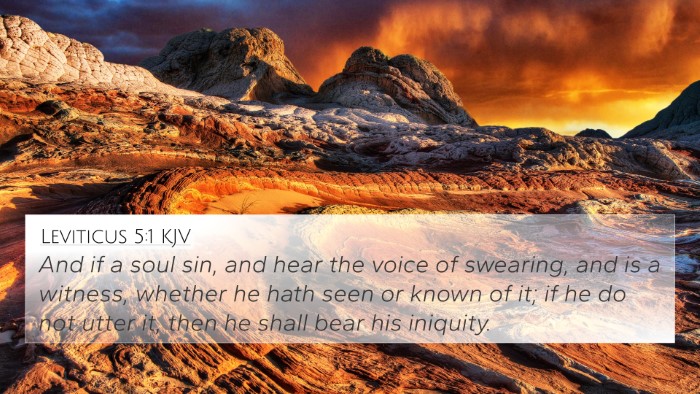Understanding Leviticus 19:21
Leviticus 19:21 states: "And the priest shall make an atonement for him with the ram of the trespass offering before the LORD for his sin which he hath done: and the sin which he hath done shall be forgiven him." This verse encapsulates the broader themes of atonement, forgiveness, and the importance of ritual in maintaining a relationship with God.
Contextual Overview
In the book of Leviticus, particularly chapters 19 and 20, there is a profound emphasis on holiness and the ethical conduct expected of the Israelites. This scripture is situated in a larger context that addresses moral and ceremonial laws, and it serves to illustrate the necessary steps for dealing with sins, particularly those committed unintentionally.
Interpretation from Commentaries
Matthew Henry emphasizes the need for atonement, explaining that sin creates a barrier in our relationship with God, but through designated offerings, one can seek restoration. He points out that the sin offering represents not only accountability but also God's willingness to forgive, illustrating the theme of divine mercy.
Albert Barnes elaborates on the concept of atonement in this verse, noting that the priest’s role in making atonement illustrates the idea that human mediation is essential for reconciliation with God. Barnes points out the significance of the ram of the trespass offering, which symbolizes the costliness and seriousness of sin.
Adam Clarke provides a detailed explanation of the ceremonial aspects surrounding atonement, indicating that the actions taken by the priest are not merely ritualistic but serve a profound purpose in the spiritual life of the community. Clarke discusses how these rituals were intended to instill a sense of responsibility among the Israelites concerning their actions.
Key Themes
- Atonement: The necessity for reparation and seeking forgiveness from God.
- Forgiveness: God’s readiness to forgive those who earnestly seek reconciliation.
- Ritualistic Practices: The importance of ceremonial laws in approaching God.
- Human Mediation: The role of priests in communicating and implementing God's forgiveness.
Cross References
This verse connects to several other passages, enhancing our understanding through the following Bible verse cross-references:
- Leviticus 4:20 - Discusses the atonement for unintentional sins.
- Hebrews 9:22 - "Without the shedding of blood, there is no forgiveness." Highlights the necessity of sacrifice.
- Matthew 5:23-24 - Encourages reconciliation before offering gifts to God, illustrating the need for ethical conduct.
- 1 John 1:9 - Assures believers that if they confess their sins, God is faithful to forgive.
- Isaiah 53:5 - Prophesies the suffering servant whose wounds will bring healing and reconciliation.
- Romans 5:8 - Emphasizes God's love demonstrated through Christ's sacrifice for sinners.
- James 5:16 - Encourages confessing sins to each other as a means of healing and restoration.
Thematic Bible Verse Connections
Understanding Leviticus 19:21 within the wider narrative of Scripture reveals the interconnection between various themes:
- Sin and Atonement: The theme of sin requiring atonement is pervasive throughout the Old Testament and culminates in the New Testament with Christ as the ultimate sacrifice.
- Forgiveness and Reconciliation: Biblical teachings emphasize the importance of seeking forgiveness, both from God and from one another, reinforcing relational harmony.
- Mediation by Priests: The priestly role in the Old Testament foreshadows the New Testament understanding of Christ as the High Priest.
Tools for Bible Cross-Referencing
For deeper study, various tools for Bible cross-referencing can enhance one’s understanding of biblical themes and connections:
- Bible Concordance: A tool that can help locate verses related to specific words or themes.
- Bible Cross-Reference Guide: Facilitates the finding of related Scripture passages across the Bible.
- Cross-Reference Bible Study: A method for diving deeper into thematic studies through linked scriptures.
Cross-Referencing Bible Study Methods
To effectively engage with Leviticus 19:21 and similar scriptures, consider these cross-referencing Bible study methods:
- Identify themes and track them through both Testaments using a concordance.
- Compare the teachings of the Old Testament with applicable New Testament scriptures.
- Analyze similar passages for a holistic understanding of biblical doctrines.
Conclusion
In conclusion, Leviticus 19:21 serves as a vital verse that encapsulates key spiritual themes of atonement and forgiveness, highlighting the significance of priestly intercession and the rituals that facilitate a connection with God. Through careful study and cross-referencing, one can gain insight into how this verse links with broader biblical narratives, serving not only as a historical reference but as a timeless source of spiritual application.
